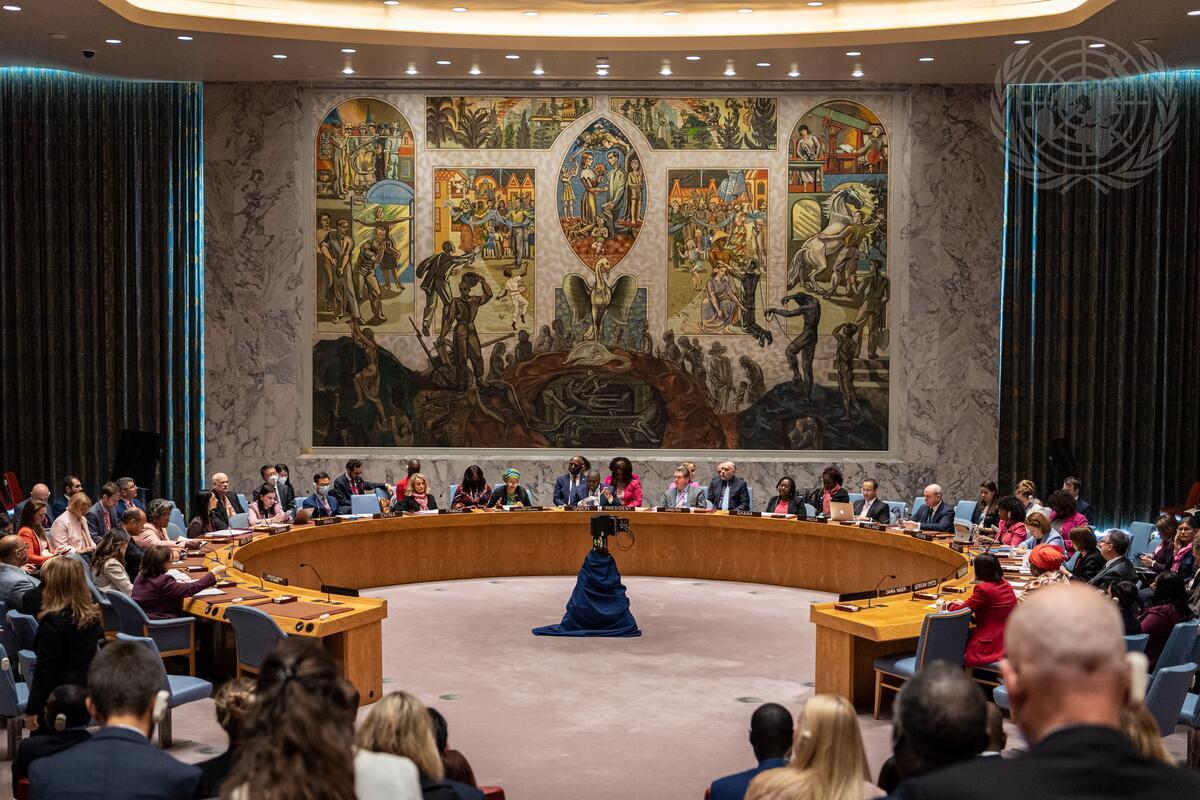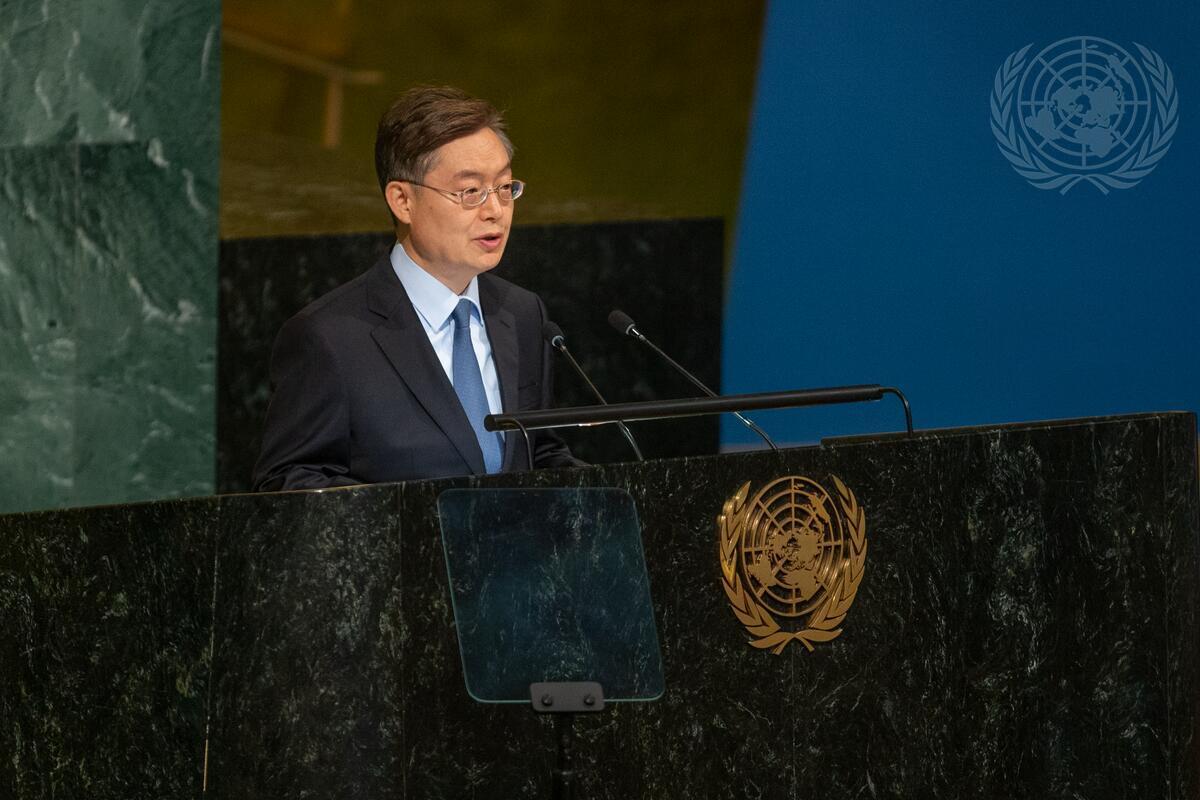 |
A wide view of the Security Council meeting on Women and peace and security. The meeting focuses on “Strengthening women’s resilience and leadership as a path to peace in regions plagued by armed groups”. The Council heard a Report of the Secretary-General on women and peace and security. (UN Photo/Rick Bajornas) |
South Korean Ambassador to the UN Hwang Joon-kook openly highlighted human rights violations that North Korean women defectors have faced during the UN Security Council’s open debate on Women, Peace and Security on Thursday.
In his speech, Hwang called for the international community to pay attention to multiple difficulties faced by the women defectors from North Korea, who account for 72 percent of nearly 34,000 North Korean defectors who have resettled in South Korea since the 1990s.
“It is appalling and heartbreaking that many of them only reach the ROK after years of enduring the risks of detainment, human trafficking, repatriation and subsequent reprisals, including torture and other cruel punishment,” Hwang said, referring to the Republic of Korea, the official name for South Korea.
Hwang also urged neighboring countries, likely referring to China and Russia, to stop forcibly repatriating North Korean refugees and to abide by the international human rights law forbidding refoulement.
“In this regard, we would like to remind the neighboring countries that the principle of nonrefoulement should be equally applied to the DPRK defectors,” Hwang added, referring to the Democratic People's Republic of Korea, the formal name for North Korea.
Hwang’s speech marks the first time that the South Korean government has raised human rights violations against North Korean women defectors at an open debate of the UN Security Council, according to South Korea’s permanent mission to the UN. An open debate involves diverse speakers including Council and non-Council members, and representatives of nongovernmental organizations among others.
In December 2017, then-South Korean Ambassador to the UN Cho Tae-yul raised the issues of human rights violations faced by North Korean defector women after being repatriated to North Korea at the UNSC meeting on the human rights situation in North Korea. But only Council members and countries concerned participated in the meeting.
Vocal about human rights issues
Hwang also expressed the Yoon government’s deep concerns over North Korean defectors detained in a third country, in his statement during the general discussion on the promotion and protection of human rights of the Third Committee of the UN General Assembly on Thursday.
Hwang highlighted that the UN Office of the High Commissioner for Human Rights “continues to document serious human rights violations upon their repatriation to the DPRK, including torture and other cruel treatment or punishment.
“In this regard, we would like to remind the member states that the principle of nonrefoulement should be equally applied to the DPRK defectors.”
At the UN general discussion, Hwang openly raised a range of key human rights issues as well as the killing of South Korean fisheries official Lee Dae-jun by North Korean soldiers two years ago.
“Furthermore, we deplore the incident in which an unarmed ROK civilian was killed by the DPRK military in the Yellow Sea in September 2020,” Hwang said. “We urge the DPRK to disclose all relevant information and ensure such events are not repeated.”
Hwang called for North Korea to have a “constructive dialogue in an urgent manner on the issue of the abductees and prisoners of war” and resume inter-Korean dialogue to facilitate reunions of separated families.
 |
Hwang Joon-kook , Permanent Representative of the Republic of Korea to the United Nations, addresses the resumed 11th Emergency Special Session of the General Assembly on Ukraine.(UN Photo/Cia Pak) |
“In this context, we are fully in line with the newly appointed UN special rapporteur’s scope of mandate, highlighted in her recent report to the General Assembly, particularly concerning accountability,” Hwang said.
“We will take heed of her ongoing work plan to refer the DPRK situation to the International Criminal Court and for the General Assembly to establish an ad hoc tribunal or other comparable mechanisms.”
Elizabeth Salmon, UN special rapporteur on the situation of human rights in North Korea newly appointed by the Human Rights Council, said that “the accountability agenda will be prioritized” in her first report released this month,
To that end, Salmon said she will engage with relevant stakeholders including governments and advocates to explore and utilize “all existing avenues such as universal jurisdiction, domestic courts and others to prosecute those who have allegedly committed serious human rights violations.”
The incumbent Yoon government has redoubled efforts to address human rights violations that North Korean people and defectors have suffered. The Yoon government has been vocal about human rights abuses executed by the Kim Jong-un regime at the UN, making a policy shift from the Moon Jae-in government which kept silence over North Korean human rights issues.
First meeting with families of detainees
In line with such efforts, South Korean Unification Minister Kwon Young-se met families of South Koreans detained in North Korea on Friday afternoon at the government complex building in Seoul. The meeting marks the first time that a unification minister has met with the families of South Korean detainees.
Kwon underscored the Yoon government’s commitment to “shooting its bolt and leaving no stone unturned” to bring the detainees back to South Korea during his meeting with the families of the detainees, including missionary Kim Jung-wook, arrested by North Korean authorities in 2013.
Six South Korean citizens -- three missionaries and three defectors -- have been trapped in North Korea since October 2013.
In addition, the Yoon government is notably expected to co-sponsor a European Union-drafted resolution addressing dire human rights situations in North Korea for the first time in four years.
South Korea co-sponsored the North Korean human rights resolution between 2008 and 2018, but the Moon Jae-in government began excluding itself from a list of co-sponsors in 2019 in light of efforts to improve inter-Korean relations.
The Yoon government appointed Lee Shin-wha, an international relations professor at Korea University, as the ambassador-at-large on North Korean human rights two months after its inauguration. The post had been vacant for the prior five years under Moon.






![[Today’s K-pop] Blackpink’s Jennie, Lisa invited to Coachella as solo acts](http://res.heraldm.com/phpwas/restmb_idxmake.php?idx=644&simg=/content/image/2024/11/21/20241121050099_0.jpg)
